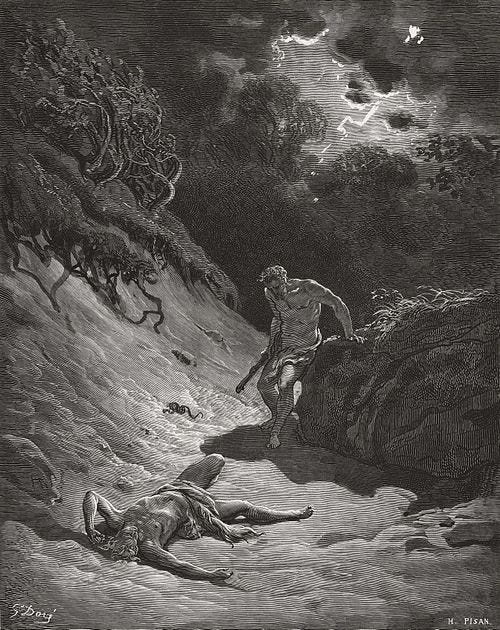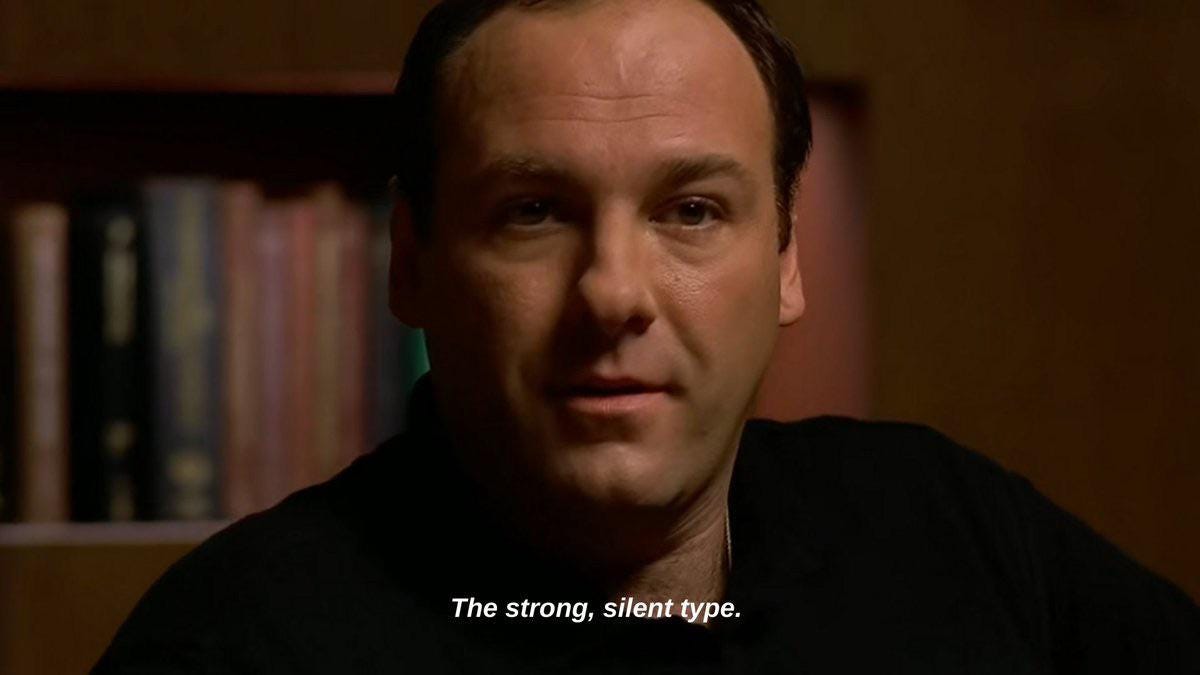We are the children of Cain
We have chosen idolatry in urban toil over piety and freedom
Now Abel was a keeper of sheep, and Cain a worker of the ground.
In the course of time Cain brought to the Lord an offering of the fruit of the ground, and Abel also brought of the firstborn of his flock and of their fat portions.
And the Lord had regard for Abel and his offering, but for Cain and his offering he had no regard. So Cain was very angry, and his face fell.
The Lord said to Cain, “Why are you angry, and why has your face fallen? If you do well, will you not be accepted? And if you do not do well, sin is crouching at the door. Its desire is contrary to you, but you must rule over it.”
Cain spoke to Abel his brother. And when they were in the field, Cain rose up against his brother Abel and killed him.
Then the Lord said to Cain, “Where is Abel your brother?” He said, “I do not know; am I my brother's keeper?”
And the Lord said, “What have you done? The voice of your brother's blood is crying to me from the ground.”
— Genesis 4:1–10
And they said, “Come, let us build ourselves a city and a tower with its top in the heavens, and let us make ourselves a name, lest we be scattered upon the face of the entire earth.”
— Genesis 11:4
So begins murder and the recursive tale of fratricide amongst men.
Abel and Cain represent two archetypes. Cain is “a worker of the ground”, the obedient farmer enriching the great agrarian societies of the near-East, the idolatrous Egyptian and Babylonian civilisations. In tilling the earth he follows his father Adam who was condemned to work the soil for his transgressions in Eden (“In the sweat of thy face shalt thou eat bread, till thou return unto the ground”). Abel is the shepherd, “willing to forsake the might and riches of the great civilizations for the sake of personal freedom and the hope of something higher.”1 After Cain slays his brother he is banished and builds the first city. Cain is the father of cities. Cities come to be places of sin and corruption (Babel, Sodom, Nineveh).
These archetypes flow through the Hebrew Bible. Abraham, the first Jew, leaves his father’s house and its idols in the metropoles of Ur to found a new life and people as a nomad and shepherd. He leaves the city life for freedom and proximity to God.
Joseph walks in the path of Cain. As Yoram Hazony writes:
Jacob raises his children as shepherds, but his beloved Joseph is different. Joseph’s dreams are of harvesting grain – that is, of farming; and after hearing of it, his brothers sell him into Egypt, a powerful and grain-rich nation where shepherds are detested as an “abomination.”
Moses leaves Egyptian royalty in favour of justice and life as a shepherd, and returns to free the Jews from bondage with his shepherd’s staff.
Who are we?
We think of ourselves as walking in the steps of Abel, the first victim-hero of the Bible. But actually in every way we are the children of Cain.
We are city-dwellers
Who are we if not city dwellers? What is our civilisation today if not born of great industrialisation and agriculture? If there was doubt two millennia ago in the shadow of the Roman empire, surely there is no doubt after the last two centuries of relentless urbanisation.
In 2016 for the first time in history the majority of people in the world lived in cities. That trend has continued apace. The relentless laws of agglomeration have turned our cities into vast, unprecedented metropoles. From 1900 until today, Cairo grew from a population of half a million to 22 million; Shanghai from 1 million to 31 million; NYC from 3 million to 10 million. And so around the world.
We enjoy the splendour of great civilisations
Between life in tents and the splendours of civilisation, we long ago chose the latter. I mean all of us, but even Jews in particular are some of the most urbanised peoples on earth.
Joseph curries favour in the land he was sold to as a slave, gains influence and prestige, and ultimately accrues vast powers — only to wield them in the service of Pharoah. A powerful slave is still a slave. He does not deliver his people from Egypt, who are enslaved after his death. He does not even deliver himself, marrying an Egyptian noble, adopting the customs of the Egyptians, and dying in Egypt, finally being embalmed in the custom of his masters.
The great financiers of New York and London follow in Joseph’s steps. Joseph was the first great distressed real estate investor, buying up all the land in the time of famine and demanding 20% of the people’s harvest (the market rate for carried interest is 20% to this day):
20 So Joseph bought all the land of Egypt for Pharaoh, for all the Egyptians sold their fields, because the famine was severe on them.
23 Then Joseph said to the people, “Behold, I have this day bought you and your land for Pharaoh. Now here is seed for you, and you shall sow the land.
24 And at the harvests you shall give a fifth to Pharaoh, and four fifths shall be your own, as seed for the field and as food for yourselves and your households, and as food for your little ones.”
Joseph’s great mobilisations of Egyptians and public works might even remind us of a very specific Jewish New York viceroy: Robert Moses, who ruled over New York for decades — and who too forgot he was a Jew. If the story of Joseph is a warning of the perils of power and accommodation to the point of total personal devolution and assimilation, this too is a rather pointed lesson for modern diaspora Jewry, especially in America.
We’re yappers
Not a single word of Abel’s is recorded.
He’s the strong silent type. He sure didn’t podcast.
As Tony Soprano once asked, whatever happened to Gary Cooper Abel, the strong silent type?
Overrun by TikTok and YouTube. We’re yapping more, endlessly. We live in the land of yappers.
We choose to live on our knees
We are not freedom loving slouches like the shepherd; our world is shaped by the Puritan zeal for work of the Anglo settler and the Chinese industrialist. As Cochran and Harpending wrote so poignantly in The 10,000 Year Explosion, the modern West is descended from farming societies — deeply domesticated populations:
If your ancestors were farmers for a long time, you’re descended from people who decided it was better to live on their knees than to die on their feet.
We LARP revolution online, docile, working laptop jobs, less violent than ever, bearing fewer children than ever, addicted to the lifeslop of porn and video games and online gambling.
Our culture is dominated by hunter-gatherer beats
In his Music: A Subversive History, Ted Gioia notes the deep historical and cultural chasm between pastoral music and the music of hunter gatherer societies.
Pastoral music evolved from sounds that were pleasing to herd animals or necessary to the shepherd — think yodeling or gentle flute melodies. Certainly nothing that would scare their flock — like drums. Christianity deepened this pastoral inclination by suppressing percussion instruments in favor of vocal purity and harmony.
Hunter-gatherer music, by contrast, relied on loud, assertive sounds, often involving drums, to scare away predators and assert territorial dominance. Both music cultures persist — country music representing a more tranquil, nostalgic, rural ethos, and rap-adjacent music representing a more aggressive, urban culture.
The eternal split between Abraham the pastoralist and the people of Ur, of Jacob the pastoralist and his fierce hunter brother Esau. We live in a culture dominated by the latter.
“[C]ountry singers can keep on writing new songs about the same old subjects for going on a century, and never lose their audience… The blueprint for down-home living isn’t a future utopia—it’s holding onto the good ol’ days.”
— Ted Gioia, Music: A Subversive History
Australians are no longer Abel
Maybe, once, Australians were Abel. Australia began a life as the shepherd. Sheep exploded across this continent like on no other continent in history. In the early 1800s, sheep occupied land the size of Ireland every year. The carousing shepherd boy plays an important role in deep Australian lore. The low maintenance, self-reproducing, easily transported and countercyclical meat and wool produce of sheep stood this country up.
But by around 1911, the Australian population became majority city-dwelling. Today around 90% of Australia’s population lives in cities. We are city dwellers.
The drover, the shearer, the bush poet have long given way to the bureaucrat, the university administrator, and the banker.
One might argue we were never Abel, committing the sin of Cain at settlement, upon which we built great cities.
Do we please God by doing well?
But perhaps we miss the point. God is pleased by Abel because he dissents from God’s curse to till the earth. God is pleased with Abel’s clever innovation to better himself. God is not pleased by Cain’s supplication and obedience to God’s decree, Cain’s special piety in his sacrifice. “If you do well, will you not be accepted?” he tells Cain.
To improve your lot is better than excess piety. Perhaps today city-dwelling is the only way to improve our lot. The great urban hubs of technological process in Silicon Valley and New York and Tel Aviv and Shenzhen (and Sydney?) are the path to betterment.
Or perhaps we have built Babel again — only this time it hums with silicon, not brick. Our tongues are one; our gods are algorithms. We have paved over the ground. We cannot hear its cry. Cities are where fertility goes to die. We bask in the golden glow of modernity, stumbling doe-eyed and sterile. God asked Cain to rule over sin; instead, we’ve domesticated it, industrialised it, scaled it. And if He were to ask again, “Where is your brother?” — would we even hear Him above the noise of our machines?
Come, let us make a name for ourselves.




Maybe you would enjoy René Guénon's The Reign of Quantity and the Signs of the Times if you haven't read it already, which is where I first encountered the theme of this essay. He also connects it to a pretty interesting idea about living in time versus living in space.
This has stirred a reminder in me. "There is a saying that no man has tasted the full flavor of life until he has known poverty, love and war." - https://americanliterature.com/author/o-henry/short-story/the-complete-life-of-john-hopkins
"In rural places the terms do not mean so much. Poverty is less pinching; love is temperate; war shrinks to con- tests about boundary lines and the neighbors' hens."
O. Henry then proceeds to tell a short tale of the man of the city and his reduced facsimile of poverty, love, and war as experienced by the urban man in a single evening.